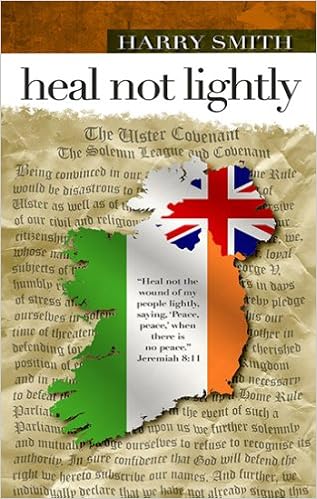HEAL NOT LIGHTLY, as the title suggests, is a book about healing – not light healing that might be applied with antiseptic cream, or a sticky-plaster or band-aid, but a deep one, that might require the skill of a surgeon. More often than not, problems between ethnic groups fit into the latter category. This book takes a look under the surface of what have been called “The Troubles” of Northern Ireland, and Harry Smith finds a few areas requiring the deeper sort of healing.
One of these is the Ulster Covenant, which was the response of the Protestants of Northern Ireland in 1912 to the proposed Home Rule Bill that had been submitted to the British Parliament, and looked like was going to become law. This would have placed all of Ireland, North and South, under an autonomous parliament in Dublin.
This was good news to the Irish Catholic community, whose experience of British rule had been quite turbulent and often traumatic. However, the Protestants community in Ireland didn't share the same historical perspective. There were other issues.
Among the biggest was that such a parliament would have a Catholic majority. The Protestant community who had migrated to Ireland in large numbers during the times of Queen Elizabeth I, James I, and William of Orange to serve as their political pawns, would suddenly find themselves in the minority. It was rightly believed that the Dublin government would be heavily influenced by the Catholic Church. A common slogan was, “Home rule is Rome rule”. If that seems far-fetched, remember that religious freedom was not taken for granted in Europe then as it is now. Also, those were the days before the Vatican II council, which liberalised the Catholic Church's position towards non-Catholics (however, even now, there are many Protestants who regard these changes as strictly cosmetic).
So, many Protestants feared the worst. The Protestants of Northern Ireland, primarily under the leadership of the Presbyterian, Church of Ireland and the Methodist churches, banded together and signed a document called the Ulster Covenant. In this, they swore not to submit to Home Rule, and in the event that it was forced on them, to resist, taking up arms if necessary. Some prominent Ulster Protestants signed it with their blood. This covenant has been the basis of Northern Irish identity ever since.
The first chapter of the book contains numerous statements in the press by various church leaders, politicians, editors and others regarding the danger that was eminent, and the necessity of every Protestant who values his history and his freedom as a British subject. Just reading them gives one a sense of the atmosphere that prevailed. In all, around 250,000 men signed the covenant – with a similar number of women signing a supporting document.
Harry Smith also goes into some more background, relating how former Moderators of the Presbyterian Church in Ireland utilised the Scottish National Covenant of 1638 to unite people politically and spiritually against the Home Rule Bill.
The Scottish National Covenant was a vow of solidarity, which established Scotland as a Christian nation under God with their Presbyterian values, in their resistance to attempts at control by the Church of England. In effect, it was a reminder to God whose side He was on. It was even said that in the same way that God had once regarded the Israelites as His chosen people, whom He had now rejected under the New Covenant, He now regarded the Scottish nation. In other words, Supersessionism, or Replacement Theology was a cornerstone of Covenant terminology.
Then, we read details of how, during the times of James I and William of Orange, Scottish Protestants were offered land in Ireland from which Irish Catholics had been forcibly removed. They regarded this as their divine mandate, and that later became the basis of the Ulster Covenant.
So, whose side was God on? Reading all the press statements in the first chapter compels one to consider that a covenant may have seemed like a good idea at the time. In fact, one would have been considered a traitor – an enemy of God – for opposing it. But was it really a good idea? The song by Bob Dylan, “With God on Our Side” comes to mind.
Harry Smith believes that the Ulster Covenant is now one of the biggest hindrance to peace in Northern Ireland.
But, you ask, didn't the Good Friday Agreement bring peace? There still exist huge fences crossing whole sections of Belfast, which are referred to as the “peace wall”. They are, in fact, proof that there isn't peace, otherwise, why would we need walls to separate us? That actually fits with the same passage in Jeremiah 8:11 from which Harry Smith took the title: "They have healed the wound of my people lightly, saying, ‘Peace, peace,’ when there is no peace."
God showed Harry Smith that it is like a log-jam that holds back the flow of His Spirit - like the river mentioned in Ezekiel chapter 47, which brought healing to the land. Repentance at Church government and personal levels are essential for the removal of this log-jam so as to release the river of God.
To achieve peace in Northern Ireland, Protestants in Northern Ireland must renounce the Ulster Covenant, and the Nationalist community must renounce the Sinn Fein Covenant (that was signed a few years later); let go of our political agendas, and trust God to direct the future according to His plan.
There are also chapters on intercessory prayer, a helpful exposition on the basis for believers' authority, and many practical guidelines on how to seek God's plan for a city or a nation, with particular emphasis on Ireland. Even if it were just for those aspects, it's a worthwhile read.
If you're interested in ethnic reconciliation and want to understand more clearly, what you're up against, definitely, get this book.









No comments:
Post a Comment